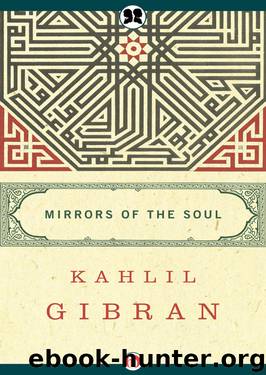Mirrors of the Soul by Kahlil Gibran

Author:Kahlil Gibran [Gibran, Kahlil]
Language: eng
Format: epub
Publisher: Philosophical Library/Open Road
Published: 0101-01-01T00:00:00+00:00
* *
Gibran, in his articles about Avicenna, Al Farid and Al Ghazali, left no doubt about his admiration for these great Arabic philosophers and made clear his belief in the philosophy of Avicenna: “There is no poem … nearer my own beliefs and my spiritual inclination than that poem of Avicenna.”
Gibran followed the definition of Averröes: “Space and matter are in God.” Gibran said: “We are the breath and the fragrance of God.” Gibran believed in the existence of God, in the existence of the soul and its rebirth, but not according to the doctrine of Nirvana.
Those who follow the doctrine of Nirvana believe that after death the soul enters the bodies of lower animals or the bodies of other human beings; and that it passes from one body to another until it is purified. It then returns to the dwelling place of its god.
Gibran did not accept the purification process. He believed that the soul comes back to finish what the man abandoned when he left the earth.
In an article about reincarnation and Nirvana, “The poet from Baalbek,” written in Arabic, Gibran stated that the soul returns to an equal status. He wrote: “And the prince inquired, saying, ‘Tell us, O sage, will the gods ever restore me to this world as a prince and bring back the deceased poet to life? Will my soul become incarnated in a body of a great king’s son and the soul of the poet in the body of a great poet? Will the sacred laws permit him to face eternity composing poetry about life? Will I be able to shower him with gifts?’ And the sage answered the prince saying: ‘Whatever the soul longs for it will attain. The sacred laws which restore the Spring after the passing of the winter will reinstate you a prince and will reinstate the poet as a poet.’”
Gibran wrote in The Prophet:
Fare you well, people of Orphalese
This day has ended.
Forget not that I shall come back to you.
A little while, and my longing shall gather dust and foam for another body.
A little while, a moment of rest upon the wind, and another woman shall bear me.
Gibran wrote in the last page of The Garden of the Prophet:
O, Mist, my sister, my sister, Mist,
I am one with you now.
No longer am I a self.
The walls have fallen,
And the chains have broken;
I rise to you, a mist,
And together we shall float upon the sea until life’s second day,
When dawn shall lay you, dewdrops in a garden,
And me a babe upon the breast of a woman.
In the late eighteenth-century materialism gained wide hold in Europe. The economic life of society became more important than religious ethics. The theory of natural selection was held to justify might against right, whether between individuals or nations.
Nietzsche and many other writers made the “self” the center of something approaching worship. Nietzsche even proclaimed that God was dead.
John A. T. Robinson maintained that Nietzsche was not an atheist, that he was trying to free man from the God who is a tyrant, who impoverishes, enslaves and annihilates man.
Download
This site does not store any files on its server. We only index and link to content provided by other sites. Please contact the content providers to delete copyright contents if any and email us, we'll remove relevant links or contents immediately.
| Ancient, Classical & Medieval | Anthologies |
| British & Irish | Japanese & Haiku |
| Love Poems | Regional & Cultural |
| Themes & Styles | United States |
| Women Authors |
The Universe of Us by Lang Leav(15067)
The Sun and Her Flowers by Rupi Kaur(14508)
Adultolescence by Gabbie Hanna(8917)
Whiskey Words & a Shovel II by r.h. Sin(8007)
Love Her Wild by Atticus(7749)
Smoke & Mirrors by Michael Faudet(6183)
Wiseguy by Nicholas Pileggi(5767)
The Princess Saves Herself in This One by Amanda Lovelace(4966)
Love & Misadventure by Lang Leav(4841)
Memories by Lang Leav(4794)
Milk and Honey by Rupi Kaur(4739)
Bluets by Maggie Nelson(4546)
Too Much and Not the Mood by Durga Chew-Bose(4337)
Pillow Thoughts by Courtney Peppernell(4271)
Good morning to Goodnight by Eleni Kaur(4231)
The Poetry of Pablo Neruda by Pablo Neruda(4093)
Algedonic by r.h. Sin(4056)
HER II by Pierre Alex Jeanty(3604)
Stuff I've Been Feeling Lately by Alicia Cook(3448)
